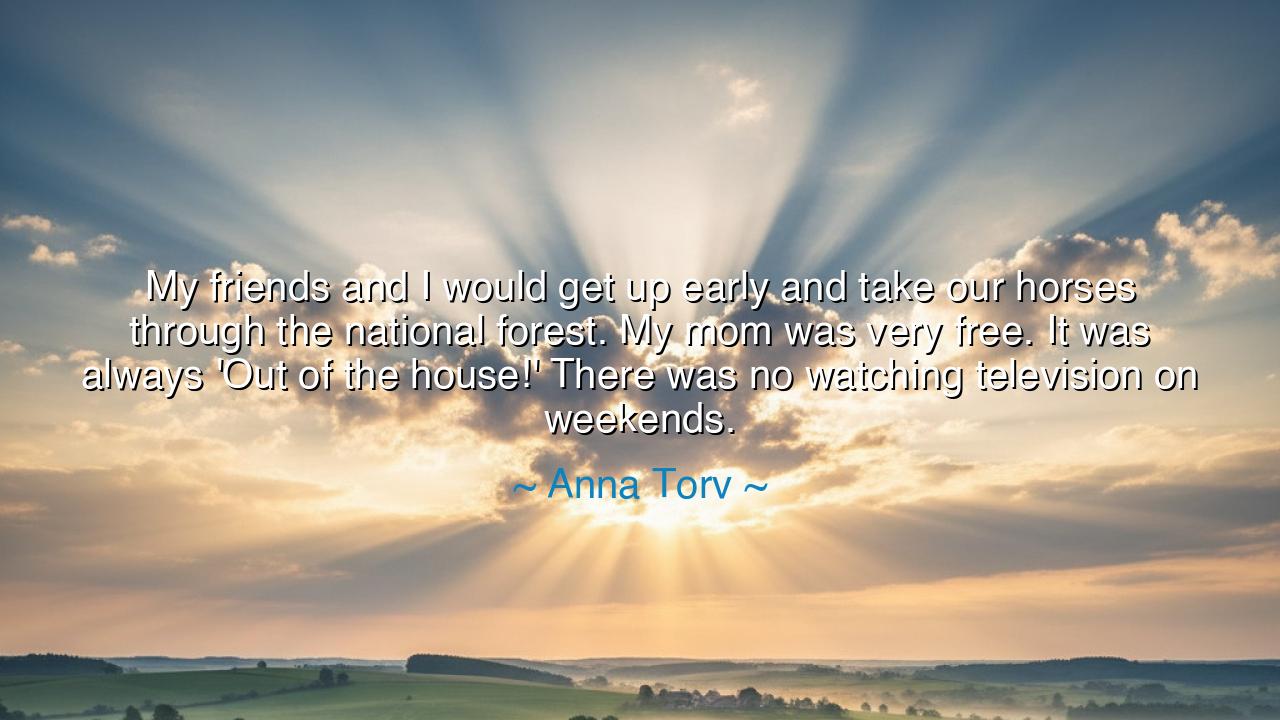
My friends and I would get up early and take our horses through
My friends and I would get up early and take our horses through the national forest. My mom was very free. It was always 'Out of the house!' There was no watching television on weekends.






Hear the words of Anna Torv, who remembered her childhood with gratitude and wonder: “My friends and I would get up early and take our horses through the national forest. My mom was very free. It was always ‘Out of the house!’ There was no watching television on weekends.” At first, these words seem but a gentle recollection of youth, yet they carry within them the weight of an ancient wisdom: that true life is found not in walls of comfort, but in the boundless expanse of the living world.
The image of friends rising with the dawn, guiding their horses through wild forests, is the image of freedom itself. It is a reminder that childhood, when allowed to stretch its limbs in nature, grows not only in body but in spirit. To ride through the forest is to learn the rhythm of the earth, the pulse of hoofbeats upon soil, the whisper of trees that have stood for centuries. Such lessons cannot be given by screens or confined rooms; they are written upon the skin and soul by wind, sunlight, and the living breath of creation.
The role of the mother in this memory is profound. Her command—“Out of the house!”—was not cruelty but liberation. In forbidding television, she was granting her child a greater gift: the chance to discover imagination in rivers, courage in the saddle, endurance in long rides, and companionship in the laughter of friends. She understood what many have forgotten: that the truest education is not only in books or classrooms, but in the school of the open sky.
History offers us kindred tales. The young Theodore Roosevelt, frail and asthmatic as a child, was pushed into the wilderness by his father, who believed that strength must be built by facing the elements. Those early adventures in forests and mountains forged the resilience that later defined him as a leader and explorer. So too in Anna Torv’s recollection, we see how parental wisdom—seemingly stern in denying comfort—becomes the soil in which freedom and courage take root.
There is also a warning in these words. A life bound too tightly to television, to walls, to artificial lights and noises, grows pale and restless. The ancients knew this well: the Spartans trained their youth under open skies; the Celts taught their children to hear the voice of the forest. To be cut off from nature is to be cut off from a part of oneself. Torv’s memory of her mom’s insistence is therefore not nostalgia, but testimony: that by being sent outward, she was brought inward to herself.
The lesson is clear: seek the forest, the field, the sky, and the waters. Do not let the glow of screens replace the glow of sunlight. Let children, and even adults, taste the wildness of life beyond walls. Ride, walk, run, climb, breathe—let your body and spirit find their natural harmony. For in doing so, you are not only exercising the flesh, but awakening the soul.
Therefore, let all who hear take this counsel: when you are tempted to remain inside, to let days slip away in passivity, recall the call of Anna Torv’s mom—“Out of the house!” Let this be your commandment too. Step into the living world, and let it shape you. Share it with your friends, honor it with your presence, and carry its lessons back into the life you build.
Thus the teaching endures: childhood spent in freedom, under the guardianship of wise parents, becomes adulthood rooted in resilience. The forest, the horse, the friends, and the mother’s stern love—all these are symbols of the true inheritance we can give and receive. Live, then, not as one who hides from life behind walls, but as one who rides boldly into the vast and living world.






AAdministratorAdministrator
Welcome, honored guests. Please leave a comment, we will respond soon